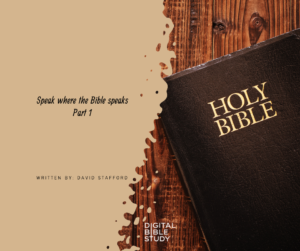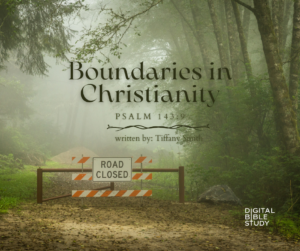Dale Jenkins
The two young guys could not have been kinder nor more polite. Our talk was engaging and lively but never heated. They showed up on my doorstep at just the time they had promised. I had an admiration for them. Two boys, barely out of their teens, one from Wyoming, the other from Utah. Pounding the pavement and doors with most, no doubt, being shut in their faces.
They had the standard issue black name tag with white embossed lettering. But I asked them anyway, “What do you want me to call you?” “Elder Jones,” answered one and the other, “Elder Stepford.”
We each expressed revere for the Scriptures and all confessed a love for Christ. At issue of any disagreement would be this point: who, or rather, what, holds the trump card when it comes to authority? It’s the issue of any religious discussion: If my priest says something different than the Scriptures, which am I going to believe? If my parents, my church, and my favorite writers/writings differ from the Bible am I going to believe them or the Bible?
Our visit was going well, a little too well. I already knew that if they reported back to their “up line” that I’d challenged them and got them thinking too much, they wouldn’t be back. In fact, they’d be transferred out of the area. We talked about some of the places the “other” book they had was different than the Bible and how to handle that. “Don’t push too hard, Jenkins,” I kept telling myself, “just get them thinking, questioning.” We looked at Galatians, and I gently asked the question that had the last two young men literally run from my den, “What if a man said he had received another gospel than the one Paul preached? Does that sound familiar at all?”
I’ve had those talks before, and there is one thing that always bugs me. This time I decided to just ask, “I was just wondering how your wife is with you so far away from home and how old your kids are (I showed them a picture of my grandson)?” They shared a rather confused look.
“We’re not married.”
“Well, I wondered how you became elders in the church then.” More confused looks.
Did you know that the Bible talks about elders in the church at length in about 5 passages (Acts 20; Hebrews 13; 1 Timothy 3; Titus 1; 1 Peter 5)?
You see, if we are going to accept the Bible as our guide and authority we learn a lot about elders.
First, we learn that each congregation is overseen, guided, and “shepherded” by its own set of leaders. Acts 14:23 says, “…when they had appointed elders in every church.”
Next, we’d learn that there is more than one name for these leaders and in these titles we learn some of the intended function. They are called “overseers” in Acts 20:28. They are called “pastors” in Ephesians 4:11 (It may shock you to learn that that word is used only one time in the New Testament). The pastor in the Bible is not the preacher, unless the preacher had also been selected to serve as one of the elders in that congregation. The word “pastor” is the word poimen in the Greek language which the Bible was originally written in. This word meant “a shepherd” and was identical to the words for “shepherd” in other passages for elders that commanded them to “shepherd, or tend the flock of God” (Acts 20:28; 1 Peter 5:1-5). In Titus 1:5-7 the terms “elders” and “bishop” are used interchangeably so an elder is also a bishop. The term “bishop” is used to show the responsibility of the leaders. By the way, the word “elder” is designed to show his spiritual age, or better, his maturity in relation to the body of believers. Yes, my two new friends were exceptional young men and very dedicated, but it didn’t take long for them to see that they didn’t live up to the terms or ideas of what an elder is to be.
Looking a little deeper we find the apostle Paul leaving two of his helpers in two very different cities with similar missions. Both Timothy in Ephesus and Titus in Crete were to preach and teach, but neither are called pastors. But letters to both of them give some directives when it comes to the qualities and qualifications of those men who are to lead as pastors.
Paul encouraged Timothy in Ephesus where they already had elders (Acts 20) with a list of what those men were to be. There was an obvious storm brewing there and if it was to be diverted God needed His men leading the church.
“The saying is trustworthy: If anyone aspires to the office of overseer, he desires a noble task. Therefore an overseer must be above reproach, the husband of one wife, sober-minded, self-controlled, respectable, hospitable, able to teach, not a drunkard, not violent but gentle, not quarrelsome, not a lover of money. He must manage his own household well, with all dignity keeping his children submissive, for if someone does not know how to manage his own household, how will he care for God’s church? He must not be a recent convert, or he may become puffed up with conceit and fall into the condemnation of the devil. Moreover, he must be well thought of by outsiders, so that he may not fall into disgrace, into a snare of the devil” (1 Timothy 3:1-7, ESV).
And he left Titus in the wicked port city of Crete to aid them in appointing the men who would lead the church there.
“This is why I left you in Crete, so that you might put what remained into order, and appoint elders in every town as I directed you— if anyone is above reproach, the husband of one wife, and his children are believers and not open to the charge of debauchery or insubordination. For an overseer, as God’s steward, must be above reproach. He must not be arrogant or quick-tempered or a drunkard or violent or greedy for gain, but hospitable, a lover of good, self-controlled, upright, holy, and disciplined. He must hold firm to the trustworthy word as taught, so that he may be able to give instruction in sound doctrine and also to rebuke those who contradict it” (Titus 1:5-9).
God knew this would be an often thankless and frequently criticized role, so He mandated that these men be ones who are “elder” (mature) and have already seen their children grow to embrace the faith in which they are trying to shepherd others. He was right. In good times elders are most often ignored, and in bad times they are the chief target of those armchair quarterback Christians who would be critics.
Embedded in these two texts are the rich gems that make up the personality of the kind of leader who will help a congregation become all it can be for God. That congregation will also have those leaders who have a grasp on the glorious gospel and the ability to steer that body away from teaching that would cause it to cease to be the Lord’s.
The reason is simple why the two fellows on my front porch that fall afternoon could not really be “elders” in God’s family. The text is clear in both places that he is both to be married and to have children. Some might say that the purpose here would be more to indicate the type of wife or kids he is to have if he is married or if he has children. But there are a few problems with that kind of thinking. First, there is no “if” in the text. Second, the text actually says nothing about the quality of the wife, just that he is to have one. And finally, if we were to ignore this teaching why not toss out any of the others in the text that we dislike.
There is another area that must be looked at, especially considering our current culture. Without arguing the reason for the role only belonging to men, the Scriptures make it clear that this is a role reserved for men. No woman can be the “husband of one wife” (1 Timothy 3). But we must hasten to point out that there is also no indication that this role is to elevate these individuals to a place of superiority or self-importance. In fact one of the reasons given for him being more mature is so he not become “puffed up with conceit and fall into the condemnation of the devil” (vs. 6). Any man who thinks the “role” makes him superior is not qualified for that role. Peter deals with this with precision when he writes: “…shepherd the flock of God that is among you, exercising oversight, not under compulsion, but willingly, as God would have you; not for shameful gain, but eagerly; not domineering over those in your charge, but being examples to the flock” (1 Peter 5:2-3). A church with domineering elders will feel choked and never reach its full potential. But a church where the leaders strive to be examples will have leaders who are first servants. No, there is nothing here demeaning to women. It is a “role” given to men by God. A woman has no more reason to be upset by this than a man might be that he cannot enjoy the connections and joy of bringing new life into the world by giving birth.
When you take the two texts together you’ll come up with a profile of the kind of person God wants leading His Family here on earth:
- blameless
- husband of one wife
- temperate, self-controlled
- sober-minded
- just
- holy
- of good behavior
- hospitable
- able to teach
- knowledgeable and holding fast to sound doctrine that he may be able to both exhort and convict those in contradiction with Bible
- not given to wine
- not violent
- not quick-tempered
- not greedy for money
- not self-willed
- hospitable
- lover of what is good
- gentle
- not quarrelsome
- not covetous
- having faithful children not accused of of dissipation or insubordination
- rules his own house well, having his children in submission with all reverence
- not a novice
- have a good testimony of those outside the church
Looking at every text you will never find an elder or pastor serving alone. There is never a church that has a single pastor or bishop leading it. You will also never find a man shepherding more than one congregation. Each congregation is to have its own leaders. This genius of God keeps any individual from having more authority than outside of his own congregation, and it keeps each elder in each congregation also under the authority of the other shepherds in that congregation. It also keeps one congregation from having authority over another congregation. Christ is the only head of the church (Ephesians 5:23), and He is the only Chief Shepherd (1 Peter 5:4).
But this is in no way to indicate that pastors have no authority. And while their authority is crippled should they not be examples, they have more authority than just that of example. Hebrews 13:17 says it plainly: “Obey your leaders and submit to them, for they are keeping watch over your souls, as those who will have to give an account. Let them do this with joy and not with groaning, for that would be of no advantage to you” (ESV).
The role of elder is one of the most important but least appreciated in the world today. Make sure that the church you are a part of has quality pastors who are qualified pastors: men who love the church and the truth and men who love the people in that church. Paul described a church without elders as having “things that are lacking” (Titus 1:5 NKJV). When you consider what an elder or pastor is to be and to be doing this can be easily understood. There is a need for faithful and sound spiritual leadership in every congregation.

Applications of Jesus’ Example Prayer
Prayer is such an important part of our Christian walk. It is our way of communicating with our Heavenly Father. So, do not neglect it. Pray to Him. Talk to Him. Use the aspects we identified in Jesus’ example prayer to guide you in your prayers.

Are We Speaking Where the Bible Speaks? Part 1
There is an important question that needs to be addressed, and that question is “Are we speaking where the Bible speaks?”

Boundaries in Christianity
Take a moment to think on areas of your life where you may already have boundaries set to help keep yourself closer to God. Also, take some time to consider areas of weakness that you may be able to develop boundaries for to help keep you distanced from tempting situations and more focused on sticking to the path of righteousness.

